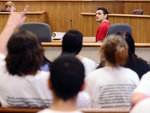


For the second time in six years, a Lewis County judge sentenced a former Centralia gang member convicted of a drive-by shooting in 2007 to 92 years in prison.
Guadalupe Solis-Diaz Jr.’s resentencing hearing Monday morning lasted more than an hour, and despite an expert defense witness testifying by phone, a nearly 30-minute argument by Solis-Diaz’s new attorney and a brief plea from the former Centralia High School student, Superior Court Judge Nelson Hunt issued the same sentence as he did in December 2007.
The courtroom was nearly full with about 30 to 40 family members, friends and supporters of Solis-Diaz, many of them wearing white T-shirts with his name, photo and the phrase, “Needs a second chance in life” printed on them.
“This is a young man who made a huge mistake,” said Solis-Diaz’s court-appointed, Olympia-based attorney, Robert Quillian. “But he is also a young man who has a great deal of potential.”
Solis-Diaz was 16 when he sprayed bullets along the east side of Tower Avenue in downtown Centralia on Aug. 11, 2007. The bullets didn’t hit anyone, but Solis-Diaz was convicted later that year on a series of assault charges and sentencing enhancements for gang-related activity and firearm use.
The shooting was one of several gang-related incidents that happened during the summer of 2007. Hunt also presided over the 2007 trial.
After a jury found him guilty of multiple felony counts, Solis-Diaz was sentenced to 1,111 months, or approximately 92.5 years, in prison, which was the high-end of the standard sentencing range for the six counts of first-degree assault, one count of drive-by shooting and one count of second-degree unlawful possession of a firearm.
In September 2012, an appeals court upheld Solis-Diaz multiple felony convictions, but ordered that he be resentenced, ruling that his defense counsel, Michael Underwood, was “constitutionally deficient” during the sentencing hearing.
Lewis County Deputy Prosecutor Sara Beigh requested Monday that the judge issue the same sentence as before, while Solis-Diaz’s attorney requested a much lower sentence of 15 years.
When given the opportunity by the judge to address the court on Monday, Solis-Diaz pleaded for Hunt to issue a lower sentence, which would give him an opportunity to one day live life outside of prison walls.
“If you give me this chance, I am going to reach out to youth and show them it’s not too late,” Solis-Diaz said.
“Let me show you I can be rehabilitated,” he pleaded. “Help me take that step toward a positive future.”
At the time of the 2007 shooting, he said he was a lost, immature teenager with no goals or dreams. He said he knows what it is like to be addicted to drugs, homeless and heartbroken.
Since his incarceration, Solis-Diaz told the judge he has earned his GED, as well as the Offender’s Second Chance certificate. He has also earned credits in graphic design, he said.
“God knows I am trying and I hope you can realize that,” he said.
Solis-Diaz, now 24, also thanked the judge for locking him up. By putting him in prison, it undoubtedly saved his life, he said.
“Believe it or not, I respect you like a man,” Solis-Diaz told the judge. “I know it’s not easy what you do.”
“If I wasn’t locked up, I’d be dead years ago,” he added.
Immediately after Solis-Diaz plea for mercy, the judge announced the sentence he imposed about six years prior would remain the same.
“The sentence will remain unchanged,” Hunt said.
Hunt spent about 10 minutes explaining his decision.
Prior to the case going to trial, the prosecutor’s office offered a plea agreement to Solis-Diaz that included only 15 years in prison, Hunt said.
Solis-Diaz declined that offer, hoping that he’d “get lucky” at trial, the judge said.
Throughout the trial, the deputy prosecutor said, several members of Solis-Diaz’s gang showed up in the courtroom and sat in the back, presumably to intimidate the witnesses participating in the trial.
Prosecutors had a difficult time getting witnesses and victims to cooperate in the trial, she said.
The 2007 drive-by shooting was one of several that plagued Centralia that summer as gang violence in the region was reaching its peak.
Since Solis-Diaz’ was sentenced to more than 90 years in prison, there have been no similar crimes in Centralia, the judge said.
“Is this a coincidence? Perhaps,” he said, adding that the high sentence sent a clear message that Lewis County would not tolerate gang-related violence.
Furthermore, the higher courts have indicated in past rulings that accountability takes precedence over rehabilitation, Hunt said.
While Solis-Diaz’s attorney argued that his client’s age at the time of the shooting should be considered as a mitigating factor, which would allow the judge to use discretion and sentence Solis-Diaz to below the standard range of 77 to 92 years, Hunt disagreed.
The Legislature enacted, and has since upheld, several laws pertaining to firearm prison sentence enhancements, as well as juveniles who commit serious violent felonies, Hunt said. The Legislature’s intentions with those law are clear: Offenders in their late teens who commit violent felonies will be treated as adults, and individuals who commit firearm-related crimes will serve extra time in prison.
For Hunt to sentence the former Centralia High School student to anything less than what the standard range calls for would go directly against the Legislature, he said.
“This sentence was exactly what the Legislature intended,” Hunt said.
Solis-Diaz’s attorney said he intended to appeal Hunt’s ruling.